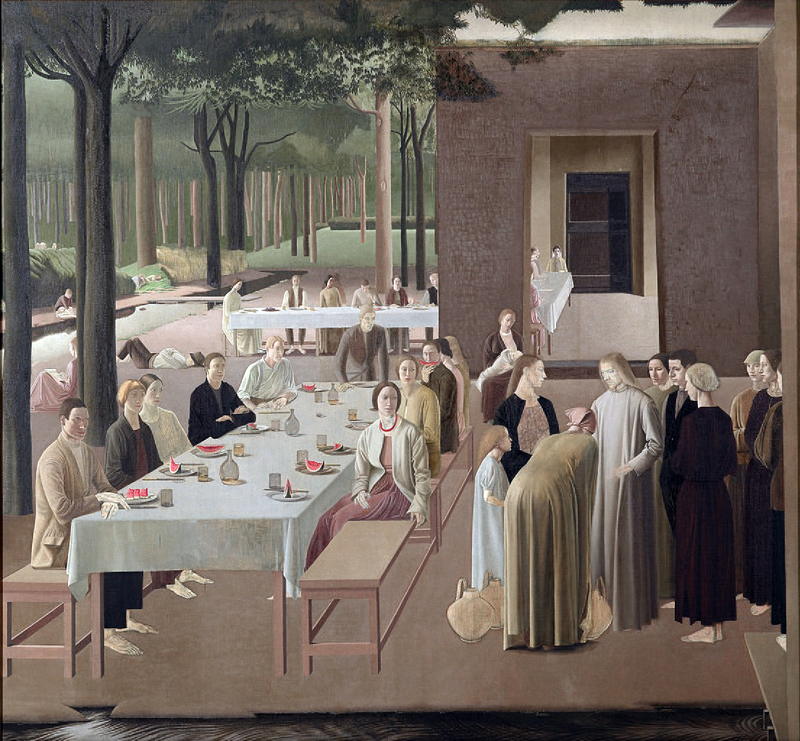
Marriage at Cana
Winifred Knights, 1923
My dear friends,
John 2:1-11 tells the story of a wedding feast, a celebratory occasion that unexpectedly faces a problem:
in Cana of Galilee,
and the mother of Jesus was there.
Jesus and his disciples
had also been invited to the wedding.
When the wine gave out,
the mother of Jesus said to him,
"They have no wine."
The wine has run out, which could potentially cause embarrassment to the hosts. Similarly, we often find ourselves in a situation where things are going smoothly, when suddenly a problem appears. It is a reality of life that we should always be prepared for unexpected challenges and cultivate the resilience to handle them.
When Mary, Jesus' mother, brings the problem to Jesus, he initially responds:
This reaction invites us to reflect upon the notions of timing and readiness in our spiritual journey. There are moments in life when we are called to step into our fullest spiritual potential, even when we feel it's not the right time or we are not ready. But like Jesus, we should recognize that challenges are opportunities for our spiritual growth.
Mary's response to the servants is a testament to her faith in her son. Here, the message is clear: have faith in divine wisdom and trust in its guidance. Faith and trust are crucial aspects of any spiritual journey.
each holding twenty or thirty gallons.
Jesus said to them, "Fill the jars with water." And they filled them up to the brim.
He said to them, "Now draw some out, and take it to the chief steward." So they took it.
The six stone water jars mentioned are significant. They were used for Jewish rites of purification, indicating they symbolize purification and transformation. The act of filling the jars to the brim reminds us of our potential to be filled with divine wisdom, love, and compassion.
(though the servants who had drawn the water knew),
the steward called the bridegroom and said to him,
"Everyone serves the good wine first,
and then the inferior wine after the guests have become drunk.
But you have kept the good wine until now."
Jesus did this, the first of his signs, in Cana of Galilee, and revealed his glory;
and his disciples believed in him.
The transformation of water into wine is a powerful symbol of spiritual transformation, indicating that when we are filled to the brim with love, compassion, and wisdom, an inner transformation naturally occurs. We begin to experience life with a new richness, depth, and sweetness, akin to the exquisite wine served last at the feast.
The fact that the servants knew about the transformation of water into wine, while the chief steward did not, suggests that divine wisdom and grace do not discriminate based on worldly ranks. It is available to all, even to those regarded as 'the least' in societal hierarchy. This egalitarian aspect of spiritual awakening is mirrored in many faiths, including Buddhism, which emphasizes that enlightenment is accessible to all sentient beings.
This event offers a reassurance that the presence of the divine is not limited to temples, monasteries, or high-ranking officials but is also found in the humblest of places and hearts. Those who serve, who humbly do their work, are often the ones who are first to witness the miracles of life. As practitioners of compassion, we are called to recognize this potential in every individual, regardless of their social standing.
The steward's exclamation, "you have saved the best for last," could be seen as a prophetic assertion about the emergence of Jesus and his teachings from the Jewish tradition. Here, the 'best wine' may symbolize Jesus' teachings that were to come, their transformative power, and the profound impact they would have on countless lives. The wine, borne from traditional vessels used for purification, implies that Jesus' teachings, while being a continuation of the Jewish tradition, also offered a renewed interpretation and depth, making them the 'best' or the most transformative.
This observation can guide our own spiritual growth by reminding us that every tradition or wisdom holds the potential for renewed understanding and profound transformation. Spiritual wisdom is not static, but it is a living, evolving entity, meant to adapt and provide meaningful guidance to individuals across different eras and contexts. As we grow and evolve in our spiritual journey, we too are called to discover and bring forth the 'best wine' from our own traditions, making them relevant and transformative for our time.